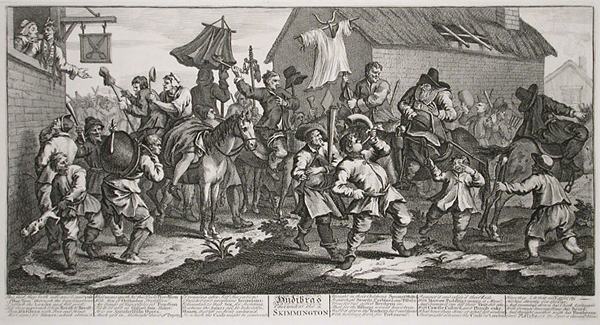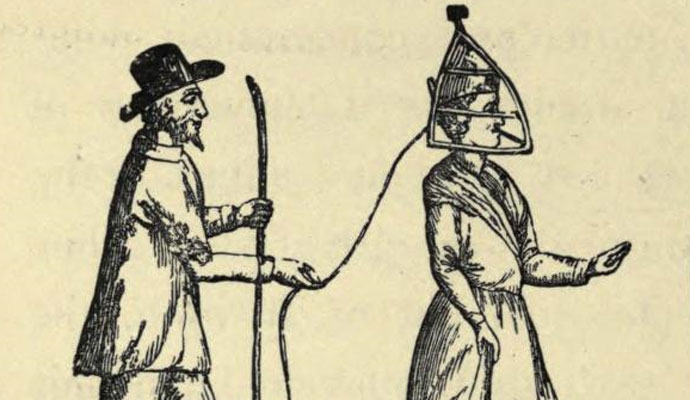3 disgusting ways independent, talkative women were tortured and shamed in Shakespeare's England
Wife talking back? Put a metal cage over her head.

A free daily email with the biggest news stories of the day – and the best features from TheWeek.com
You are now subscribed
Your newsletter sign-up was successful
Queen Elizabeth I ruled Shakespeare's England for nearly 45 years, from 1558 to 1603. During her reign, she re-established the Church of England, ended a war with France, backed the arts of painting and theater, and fended off her throne-thirsty Scottish cousin whose head she eventually lopped off for treason.
What's more, Elizabeth I never married. Devoted to her job and country, she seemed to have no interest in sharing her power with a man. The first feminist monarch, perhaps?
In that sense, you might think Elizabeth's success, authority, and independence would have trickled down to the women of England. But this was not the case. Ironically, despite its ruling monarch, Shakespeare's England tightly controlled its outspoken, free-thinking women in several unsettling ways.
The Week
Escape your echo chamber. Get the facts behind the news, plus analysis from multiple perspectives.

Sign up for The Week's Free Newsletters
From our morning news briefing to a weekly Good News Newsletter, get the best of The Week delivered directly to your inbox.
From our morning news briefing to a weekly Good News Newsletter, get the best of The Week delivered directly to your inbox.
1. Charivari

In Elizabethan England, many women were classified as scolds or shrews — perhaps because they nagged their husbands, back-talked, and/or spoke so loudly that they disturbed the peace. (Think of early-1990s Roseanne Barr or Katharine Hepburn's character in Bringing Up Baby). The presence of scolds or shrews implied that men couldn't adequately control their households. And since this type of woman inverted gender norms of the time (i.e., men in charge, women not so much), some form of punishment had to be exercised.
Neighbors often dealt with shrews themselves to evade the law — and yes, being a scold was illegal. The community would stage a charivari, also known as "rough music," a skimmington, and carting. Clanging pots and pans, townspeople would gather in the streets, their "music" drawing attention to the offending scold, who often rode backwards on a horse or mule. She faced the wrong way to symbolize the transgressive reversal of gender roles.
Shakespeare devoted an entire play to the Elizabethan scold. In The Taming of the Shrew, Katharina is "renowned in Padua for her scolding tongue," and Petruchio is the man who is "born to tame [her]," bringing her "from a wild Kate to a Kate / Conformable as other household Kates." The playwright also references the charivari or carting when one character suggests that rather than "court" Katharina, Petruchio should "cart her."
A free daily email with the biggest news stories of the day – and the best features from TheWeek.com
Here's the kicker: The legal crime of being a scold or shrew was not removed from English and Welsh law until 1967, the year Hollywood released The Taming of the Shrew starring Elizabeth Taylor and Richard Burton. Yikes.
Throughout history, charivaris have also been staged for adulterers, harlots, cuckolded husbands, and newlyweds.
2. Cucking stools

Elizabethan women who spoke their minds or sounded off too loudly were also punished via a form of waterboarding. A cucking or ducking stool featured a long wooden beam with a chair attached to one end. The beam was mounted to a seesaw, allowing the shackled scold to be dunked repeatedly in the water. The action would supposedly cool her off.
Around 1615, Samuel Pepys wrote a poem about this method of controlling women, called The Cucking of a Scold. Hyder E. Rollins describes the cucking in Pepys' poem as "no tame affair." Rather, it was a huge ceremony "involving a parade in which a hundred archers, a hundred armed men, and fifty parrots took part." Ah, 50 parrots! Here's a taste:
Then was the Scold herself,
In a wheelbarrow brought,
Stripped naked to the smock,
As in that case she ought:
Neats tongues about her neck
Were hung in open show;
And thus unto the cucking stool
This famous scold did go. [The Cucking of a Scold]
While cucking stools have been banned for centuries, in 2010, Bermudans saw one of their senators reenact this form of punishment for "nagging her husband." Travelers can also check out legitimate ducking stools on the aptly named Ducking Stool Lane in Christchurch, Dorset (England), at The Priory Church, Leominster in Herefordshire (England), and in the Colonial Williamsburg Collection in Williamsburg, Virginia.
Men were occasionally confined to the ducking stool, too, and communities also used this torture device to determine if women were witches. If the woman floated when dunked, she was a witch; if she sank, she was innocent.
3. The scold's bridle

A third device used to control women and their speech during Shakespeare's day was the scold's bridle, or brank. Resembling a horse's bridle, this contraption was basically just a metal cage placed over the scold's head. A plate inserted into the woman's mouth forced down her tongue to prevent her from speaking.
Like women who suffered through charivari and cucking stools, women squeezed into the branks were usually paraded through town. In fact, some scold's bridles, like the one above, included ropes or chains so the husband could lead her through the village or she him. Some branks featured decorative elements like paint, feathers, or a bell to alert others of her impending presence. Furthermore, some of the mouthpieces contained spikes — to ensure the woman's tongue was really tamed.
***
Shakespeare scholar Lynda E. Boose notes that in each of these cases, women's punishment was turned into a "carnival experience, one that literally placed women at the center of a mocking parade." Indeed, along with beating pots and pans, townspeople would make farting noises and/or degrading associations about the woman's body as she passed by — all of this because a woman dared to speak aloud and threaten male authority.
Western women have made monumental strides since the era of Queen Elizabeth I and Shakespeare. But in many ways, their independence is still controlled. This subjugation is present in the gender wage gap, in (male) politicians' attempts to govern women's bodies, in (male) hackers' posting personal nude photos of female celebrities, and in the degrading and dismissive way women are often represented in the media. So while a woman's punishment for speaking out or asserting her independence may no longer be carting, cucking, or bridling, the carnival of shaming still marches on.
Kelli Marshall teaches courses on Seinfeld, stand-up comedy, film musicals, Spike Lee, and other fun stuff at DePaul University. Read more about her take on the media and her experiences in higher ed at kellimarshall.net.